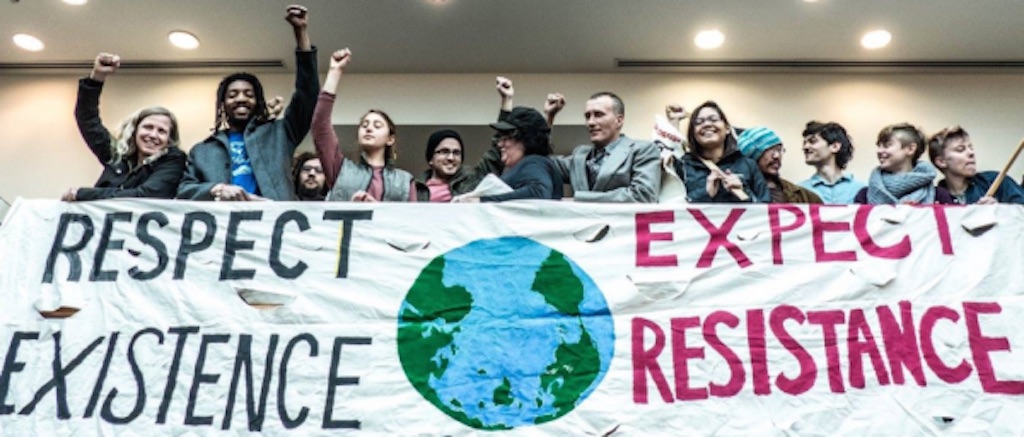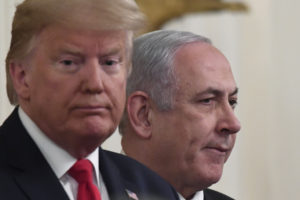Bracing for a Decade of Crisis
The impacts of the long mismanagement of climate change, inequality, militarism and other issues will soon be unavoidable. What we do now to prepare is crucial to the nation's viability. Popular Resistance
Popular Resistance
In our last article, we predicted that the 2020’s will be an era of transformation. We focused on the development of the movement since the “Take-Off” phase of the 2011 Occupy encampments, followed by Black Lives Matter, Fight for $15, Idle No More, carbon infrastructure protests, debt resistance, immigration protests and more. The 2020s will be a decade when the impacts of years of mismanagement of crisis situations, such as climate change, inequality and US militarism, become unavoidable requiring major transformations. What we do now to prepare will help determine the result.
Transformative Era will be Driven by Long Neglected Issues
For many of the issues the popular movement has been raising, the government has failed to act or taken counterproductive actions, putting the profits and interests of campaign donors ahead of the necessities of people and protection of the planet. The environment is being destroyed, the food supply is being poisoned by pesticides and the wealth divide is widening.
The massive threat of climate change has become more immediate and worse. In the last year, the scientific consensus has become more dire. The impacts are upon us now – wildfires and superstorms, war brought on by drought, mass migrations and deaths.
At the same time multiple analyses and government reports point to a fading US empire. Since the end of World War II, the US has dominated the globe politically, economically and militarily becoming the largest empire in world history. That era is coming to an end.
In his new book, “In the Shadows of the American Century,” historian and chronicler of empire Alfred McCoy writes that US empire will end in the next decade. The US is falling behind in all spheres of influence. McCoy demonstrates how US spying on foreign governments and using torture in multiple countries have undermined the US’ moral authority, as have aggressive bullying for corporation-friendly trade deals, holding back climate agreements in the Obama era and pulling out of the climate agreement in the Trump era. He chronicles the rise of China, India and Russia, among other countries. The power dynamics of the world are changing with the US being left out of important decisions while China and Russia work in tandem in more areas.
McCoy describes various scenarios for how US empire will end, depending on how the current crises play out. No matter what happens, it is up to those of us living in the US to demand the US dismantles its empire in a way that causes the least harm. Paul Street writes, “the decline of the American Empire might be a good thing for ordinary people at home as well as abroad.” Ending empire is an opportunity for changes that move us toward being a cooperative nation in a multipolar world rather than hanging on to power through military might.
The end of empire will have many repercussions. Public investment in empire has meant a lack of investment on urgent needs, e.g. repairing failing and inadequate infrastructure, rebuilding cities that have been ignored, especially in black and brown communities, strengthening education from pre-school through post-graduate, to name a handful of many inadequately-funded areas. The empire economy helped create an unfair economy at home that pushed people into poverty, debt and homelessness. To reverse those impacts, the US must shift military spending to meet civilian needs and provide funding for a new democratized economy.
System-changing Issues
The credibility of the power structure that allowed these crises to fester will shrink. On each of the issues where the people’s movement has been growing, those in power have either denied reality and done nothing or have made matters worse through counterproductive policies. Multiple crisis situations barreling toward us require mobilization for system change, not simple reforms.
The US democracy crisis is due to the corruption of money in elections, laws that prevent challenges by third parties, media that warps coverage in favor of the duopoly, gerrymandering and more. The mirage of US elections has become evident to tens of millions of people resulting in both duopoly parties being unpopular and in disarray.
System failure is also a failure of the capitalist economic system, dominated by Wall Street, monopolies and massive transnational corporations. The kleptocrats in power are looting public treasures, monetizing and profiteering off our basic necessities such as water, energy and transportation. Increasing numbers of people agree we need a new economy based on economic democracy and the Commons where key sectors are socialized and under democratic control.
In “Seymour Melman and the New American Revolution,” Jonathan Feldman describes Melman’s ideas for dismantling empire and capitalism and shifting economic and political power to people through worker ownership and other democratized systems.
The movement must position itself for this coming era of transition by: (1) weakening the power structure by protest of mistaken policies and building alternatives to replace them; and (2) specifically defining the transformations we want so that the power holders cannot deceive us with false measures.
Opportunities to build movement power
Economic justice: Inequality in the United States is extreme and the world’s wealthy grow obscenely richer. Three people in the US have wealth equal to half the population while millions in urban areas have zero wealth, tens of millions cannot handle a surprise $500 expense and an entire generation is entering adulthood in massive debt to a job market that will keep them in debt.
Over the last 40 years, CEO pay rose 937 percent while worker compensation remained stagnant. The recent tax cuts will add to all of these problems with increased debt caused by tax cuts for the rich causing cuts to social safety net programs like Medicaid and privatizing Social Security and Medicare. An economic crash seems almost inevitable as this decade comes to a close.
National consensus on issues like taxing the rich and building the economy from the bottom up will grow, creating opportunities for new economy programs, e.g. workers owning businesses, laws ensuring a livable wage, public banks, participatory budgeting where people decide public expenditures, a guaranteed income to ensure people can meet their basic needs and other programs giving people power in the economy. Not only should the recently-passed tax cuts be repealed, but an aggressively progressive income and wealth tax should be put in place along with a financial transactions tax to shrink the wealth divide and finance essential services.
Healthcare as a public good: Health care continues to be a top issue of concern as people cannot afford necessary care. Even with insurance, the deductibles and co-pays on top of high premiums are unaffordable and tens of millions of people cannot afford any insurance. To confront the healthcare crisis, the US most move from a system dominated by profits for insurance companies, Big Pharma and providers to a system where health care is a public good with equal access for all funded by a progressive tax. National improved Medicare for all has majority support and is poised to become a litmus test issue in upcoming elections.
Internet freedom with equal access for all and independent media: The attack on net neutrality has created a massive movement and national consensus that access to the Internet should be equal for all. People recognize that the Internet is essential to participate in the economy, politics and culture, resulting in calls to nationalize the Internet. The quality of Internet service must be improved so there is high speed Internet, as exists in other developed countries. We must create an Internet for the 21st Century.
Further concentration of media is limiting access to a diversity of views. Freedom of speech in the 21st Century requires protection of political speech on the Internet not only from government but from corporations, e.g. Google and Facebook, that control social media. Laws must protect independent and social media as democracy requires diverse information and robust debate.
Confronting climate change and reversing environmental degradation: There must be a rapid transition to a clean energy economy, which will create jobs for those who install solar, wind and other clean energy sources, construct efficient transit and housing, and conduct research to develop technology needed to remake the economy. The climate crisis will impact all aspects of life, including food, farming, water management, housing and more. Energy must be democratized so people who create more energy are compensated as producers and energy is socialized through public utilities. A carbon tax will encourage the change to clean energy and provide funds for the transition.
End of empire: There will be massive shifts in the economy at home and abroad and in foreign policy as empire comes to an end. The military-security state comprises a large and decentralized sector of the US economy. A just transition to a civilian peace economy will be required. The US will no longer has the power to coerce countries into signing trade deals, an economic arm of empire, that allow the exploitation of workers, communities and the environment. A new era of trade designed to protect people and planet will become possible. New international institutions will be needed to correct the weaknesses of the United Nations and allow governance that protects human rights and economic and racial equality. Mechanisms will be required to resolve conflicts between nations peacefully.
Systemic Racism: Through all these issues, racism, a hierarchy of power that allows one group of people to dominate another, is intimately intertwined. Institutions that perpetuate racism and inequality will need to be dismantled. This is not identity politics, as some have accused, nor does it negate the suffering and oppression of poor white people. It is a reality that must be faced if we are to create new systems that do not default to disparities between groups of people. Indigenous rights and sovereignty must be respected. Reparations must be paid for generations of stolen wealth.
The Task of Insuring Justice
While transitions are inevitable, it is not inevitable they will be made based on economic, racial and environmental justice and peace. It is our responsibility to educate ourselves and each other so people understand the root causes of the crises we face, build popular power and create alternative systems that have desirable results. This is not the time for reform or the belief that we just need to elect the right person. The current systems, including the electoral system, are rigged against us and we need to use popular power change them.
As Kevin Buckland writes in Roar Magazine:
“If we fail to offer scalable discursive, tactical and structural alternatives to the extractivist logic that has created the climate crisis, capitalism may itself transform the coming wave of disruptions into its own benefit, exacerbating existent inequalities for every social and ecological ‘issue’ as it strengthens its stranglehold of the future on a rapidly destabilizing battleground.”
Buckland focuses on the climate crisis, but the same is relevant for other crises. A crisis provides an opportunity for change. Those who have solutions on hand and power will determine what type of change occurs.
We face formidable opponents. They have resources, money and tools that can thwart our efforts. But this is nothing new. All movements for social transformation have faced difficult odds, still they have prevailed. We outnumber our opponents and when we work together, though we may not have the money, we do have resources and tools. We also have allies.
At a recent family gathering, one of our relatives who does human rights work remarked that people in other countries feel that they should be able to vote in US elections because the US has such a significant global impact. While that isn’t going to happen, there are ways that the international community outside the US can have influence, and that is through boycotts, divestments and sanctions. This can happen at the individual level, through institutions such as universities and at the governmental level. Activists can call on their governments to target US institutions of military and economic dominance.
During the South African Apartheid, it was South African activists who called on other nations to boycott their country. This was a primary reason why apartheid ended. A decade ago, hundreds of Palestinians came together and called for boycott, divestment and sanctions (BDS) of Israel. The BDS movement is having such a great effect that Israel is fighting to stop it.
And while we are reaching out to our international allies, we can share information with each other about what systems work and don’t work so that we can create the new world we need more rapidly. Collectively, we have greater wisdom than individually.
We live in a difficult time, but it is also a time of opportunities to correct our mistakes and build something better. Change is coming. As we wrote in 2011, history is knocking. We must all decide in 2018 how we will answer it.
Kevin Zeese and Margaret Flowers co-direct Popular Resistance.
Your support matters…Independent journalism is under threat and overshadowed by heavily funded mainstream media.
You can help level the playing field. Become a member.
Your tax-deductible contribution keeps us digging beneath the headlines to give you thought-provoking, investigative reporting and analysis that unearths what's really happening- without compromise.
Give today to support our courageous, independent journalists.






You need to be a supporter to comment.
There are currently no responses to this article.
Be the first to respond.